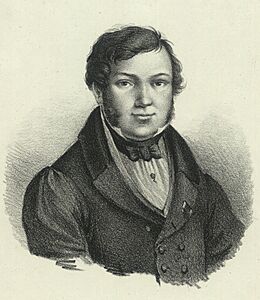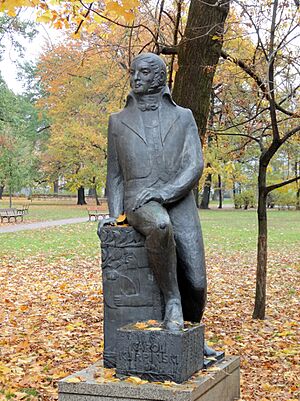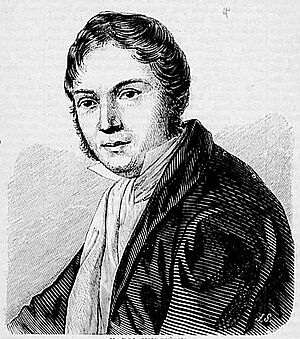Karol Kurpiński facts for kids
Quick facts for kids
Karol Kurpiński
|
|
|---|---|

Karol Kurpiński in 1850
|
|
| Born | March 6, 1785 |
| Died | September 18, 1857 (aged 72) Warsaw, Kingdom of Poland, Russian Empire
|
Karol Kazimierz Kurpiński (born March 6, 1785 – died September 18, 1857) was an important Polish composer, conductor, and music teacher. He was a key figure in late classical music in Poland. He is famous for writing the music for the patriotic song La Varsovienne in 1831. This song had lyrics by Casimir Delavigne. Kurpiński also guided and influenced the young Chopin, who later became a world-famous composer.
Contents
Karol Kurpiński's Musical Journey
Early Life and Education
Karol Kurpiński was born in Włoszakowice, a town in Poland. He started learning music from his father, Marcin Kurpiński, who was an organist (someone who plays the organ in a church). When Karol was just 12 years old, he became an organist himself at a church in Sarnowa. His uncle, Karol Wański, was a priest there.
In 1800, another uncle, Roch Wański, who played the cello, took young Karol to the estate of Count Feliks Polanowski. The Count had his own private orchestra, and Roch Wański was a member. Karol joined the orchestra and played the violin.
Moving to Warsaw and Becoming a Conductor
Around 1808, Kurpiński wrote his first opera, called Pygmalion. In 1810, he moved to Warsaw, the capital city. With help from another composer named Józef Elsner, Kurpiński became a conductor at the Warsaw Opera. He held this important job until 1840.
He also taught music at several well-known schools, and he even started his own music school. In 1815, he joined many music groups in Poland and other countries, like the Société des Enfants d'Apollon in Paris.
Royal Recognition and Contributions
In 1819, Kurpiński became the Kapellmeister (music director) for the Polish royal chapel. In the same year, he received a special award for his lifetime achievements in music. He also started and edited Poland's first music newsletter in 1820. For his contributions, he was given the Order of Saint Stanislaus in 1823.
In 1829, Kurpiński and Józef Elsner were asked to write music for the coronation of Nicolas I of Russia as the King of Poland. For this event, Kurpiński composed a piece called Te deum. This work was not performed again until 2011.
Influence on Polish Music
Kurpiński was a romantic composer and one of the most respected musicians before Chopin. He met Chopin in 1828. Kurpiński helped create a unique Polish music style. He prepared the way for Polish music during the Romantic period, especially for Chopin's works. He also helped Polish opera grow by adding new musical ideas and ways of expressing feelings.
Karol Kurpiński passed away in Warsaw on September 18, 1857, at the age of 72.
Notable Works by Karol Kurpiński

Stage Works (Operas and Ballets)
- Pygmalion, opera (around 1800–1808)
- The Palace of Lucifer, opera in 4 acts (1811)
- The Charlatan, or The Raising of the Dead, opera in 2 acts (1814)
- Jadwiga, Queen of Poland, opera in 3 acts (1814)
- The Reward, or the Revival of the Polish Kingdom, melodrama in 2 acts (1815)
- Superstition, or Krakovians and Mountaineers, or The new Krakovians, opera in 3 acts (1816)
- The Castle of Czorsztyn, or Bojomir and Wanda, opera in 2 acts (1819)
- Kalmora, or The Paternal Right of the Americans, melodrama in 2 acts (1820)
- Mars and Flora, ballet in 1 act (1820)
Orchestral and Chamber Music
- Grand Symphony Imagining a Battle, or The Battle of Mozhaysk Op. 15.
- Clarinet Concerto in B-flat major.
- Trio, for clarinet, violin and cello.
- Nocturne, for horn, bassoon and viola, Op. 16 (1823).
Piano Music
- A Dreadful Dream (1820)
- Fantaisie, Op. 10 (1823)
Vocal Works
- Six Masses, including "Country Mass" (1821).
- Te deum laudamus (1829).
- The Song of Warsaw (1831).
- The Song of the Lithuanian Legionaries (1831).
See also
 In Spanish: Karol Kurpiński para niños
In Spanish: Karol Kurpiński para niños
 | Bayard Rustin |
 | Jeannette Carter |
 | Jeremiah A. Brown |


